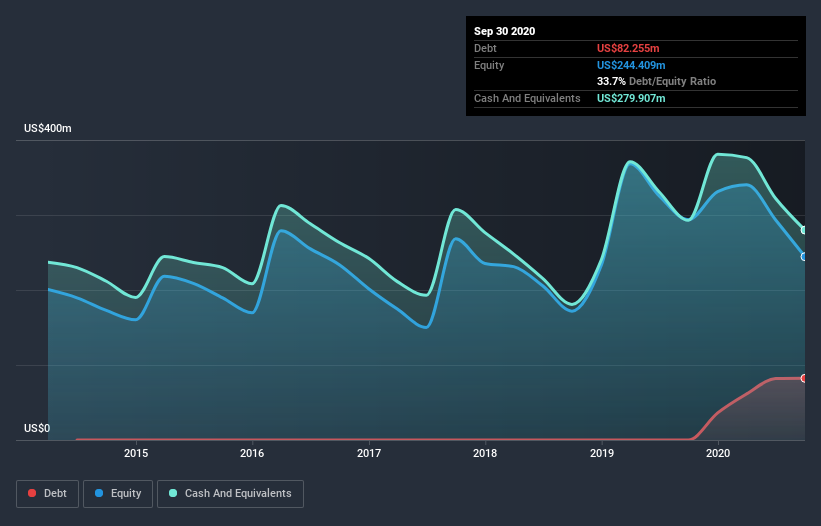
Legendary fund manager Li Lu (who Charlie Munger backed) once said, 'The biggest investment risk is not the volatility of prices, but whether you will suffer a permanent loss of capital.' So it might be obvious that you need to consider debt, when you think about how risky any given stock is, because too much debt can sink a company. Importantly, Epizyme, Inc. (NASDAQ:EPZM) does carry debt. But the more important question is: how much risk is that debt creating?
What Risk Does Debt Bring?
Debt assists a business until the business has trouble paying it off, either with new capital or with free cash flow. Part and parcel of capitalism is the process of 'creative destruction' where failed businesses are mercilessly liquidated by their bankers. However, a more common (but still painful) scenario is that it has to raise new equity capital at a low price, thus permanently diluting shareholders. Of course, debt can be an important tool in businesses, particularly capital heavy businesses. When we think about a company's use of debt, we first look at cash and debt together.
Check out our latest analysis for Epizyme
What Is Epizyme's Debt?
The image below, which you can click on for greater detail, shows that at September 2020 Epizyme had debt of US$82.3m, up from none in one year. However, its balance sheet shows it holds US$279.9m in cash, so it actually has US$197.7m net cash.

A Look At Epizyme's Liabilities
According to the last reported balance sheet, Epizyme had liabilities of US$34.8m due within 12 months, and liabilities of US$102.6m due beyond 12 months. Offsetting these obligations, it had cash of US$279.9m as well as receivables valued at US$4.61m due within 12 months. So it can boast US$147.2m more liquid assets than total liabilities.
This surplus suggests that Epizyme has a conservative balance sheet, and could probably eliminate its debt without much difficulty. Simply put, the fact that Epizyme has more cash than debt is arguably a good indication that it can manage its debt safely. When analysing debt levels, the balance sheet is the obvious place to start. But ultimately the future profitability of the business will decide if Epizyme can strengthen its balance sheet over time. So if you want to see what the professionals think, you might find this free report on analyst profit forecasts to be interesting.
In the last year Epizyme had a loss before interest and tax, and actually shrunk its revenue by 60%, to US$12m. That makes us nervous, to say the least.
So How Risky Is Epizyme?
Statistically speaking companies that lose money are riskier than those that make money. And in the last year Epizyme had an earnings before interest and tax (EBIT) loss, truth be told. Indeed, in that time it burnt through US$239m of cash and made a loss of US$222m. But at least it has US$197.7m on the balance sheet to spend on growth, near-term. Overall, its balance sheet doesn't seem overly risky, at the moment, but we're always cautious until we see the positive free cash flow. There's no doubt that we learn most about debt from the balance sheet. However, not all investment risk resides within the balance sheet - far from it. Consider for instance, the ever-present spectre of investment risk. We've identified 2 warning signs with Epizyme , and understanding them should be part of your investment process.
If you're interested in investing in businesses that can grow profits without the burden of debt, then check out this free list of growing businesses that have net cash on the balance sheet.
If you decide to trade Epizyme, use the lowest-cost* platform that is rated #1 Overall by Barron’s, Interactive Brokers. Trade stocks, options, futures, forex, bonds and funds on 135 markets, all from a single integrated account. Promoted
Valuation is complex, but we're here to simplify it.
Discover if Epizyme might be undervalued or overvalued with our detailed analysis, featuring fair value estimates, potential risks, dividends, insider trades, and its financial condition.
Access Free AnalysisThis article by Simply Wall St is general in nature. It does not constitute a recommendation to buy or sell any stock, and does not take account of your objectives, or your financial situation. We aim to bring you long-term focused analysis driven by fundamental data. Note that our analysis may not factor in the latest price-sensitive company announcements or qualitative material. Simply Wall St has no position in any stocks mentioned.
*Interactive Brokers Rated Lowest Cost Broker by StockBrokers.com Annual Online Review 2020
Have feedback on this article? Concerned about the content? Get in touch with us directly. Alternatively, email editorial-team (at) simplywallst.com.
About NasdaqGS:EPZM
Epizyme
Epizyme, Inc., a commercial-stage biopharmaceutical company, discovers, develops, and commercializes novel epigenetic medicines for patients with cancer and other diseases in the United States.
Fair value with limited growth.
Similar Companies
Market Insights
Community Narratives




